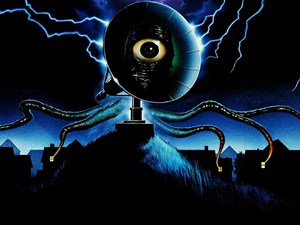Berlinale: Exploring the world from my sofa
Last week, Monday 1 - 5 March, the Berlinale Film Festival and it’s enormous European Film Market took place online. It was my first time visiting the festival, and strange to have done so from my living room. There were pros and cons to the setup - I missed out on exploring and discovering the beautiful cinemas of Berlin (one of my favourite things to do when I’m lucky enough to be abroad). I really missed the buzz of coming out of a screening full of people genuinely floored by a film that’s just premiered (Twitter really doesn’t suffice). On the other hand, there was no queuing - most film festivals I have been to, I have spent almost as much time queuing to see films as I have watching films. What’s more, rather than grabbing a bratwurst or a kebab in the rain and scoffing it under a makeshift shelter, I was able to prepare healthy lunches. I meal-prepped for the festival on Sunday night because I knew with up to five films per day I didn’t have a lot of kitchen time, and largely enjoyed them from under my duvet (I thought I could turn off the heating because it was March, I was wrong) in the comfort of my living room.
But enough about the glitz and glamour of eating salad on the sofa in front of the telly, what did I actually watch? Berlinale felt difficult to navigate online as a newcomer because there’s so much in the market. I constantly doubted whether I had chosen the right thing and had a crushing fear-of-missing-out whenever I saw someone tweeting about a film I hadn’t seen. Overall, it was a mixed bag: some stunners, a few disappointments and some real surprises. Here’s the full rundown:
Petite Maman
Every film Céline Sciamma has made has wowed me, so whenever there is a new one, I get nervous: I’ll either be disappointed or an emotional wreck. Predictably, it was the latter here. Petit Maman is the kind of quiet little film that creeps up on you, so gentle and subtle that you don’t realise what’s hit you until it’s far too late. It follows a young girl who’s grandmother passed a week earlier. When she travels to clear out the house with her family, she meets another child in the woods - her own mother at her age. A delicate film that packs an incredible amount of intelligence and nuance into a tiny 72 minute run time.
Censor
A grisly, atmospheric whirlwind of a directorial debut from British director Prano Bailey-Bond. Censor follows a troubled woman who spends her days working in film censorship for eye-popping video nasties. When one of the films she is censoring seems to strike a troubling resemblance to memories from her own past, she starts to dig a little deeper. There have been some really phenomenal British horror films of late and this certainly keeps that trend alive.
Memory Box
Maia and Alex, a mother and daughter living in Canada, receive an unexpected delivery: notebooks, tapes, and photos Maia sent to her best friend before leaving Beirut. Maia refuses to open the box or confront its memories, but Alex secretly begins diving into it. Between fantasy and reality, Alex enters the world of her mother's tumultuous, passionate adolescence during the Lebanese civil war, unlocking mysteries of a hidden past. Built around the co-directors' own archives of personal journals, tapes and wartime photographs from Beirut in the 1980s, Memory Box feels lively and fresh while being routed in real, tangible histories.
Night Raiders
I was pleasantly surprised by this low-budget, dystopian sci-fi and felt it took familiar tropes and refreshed them with a new lens. Set in a military-controlled North America, where children are considered state property and shipped off to state-run academies, Niska and her daughter Waseese have been living and hiding in the forest for years. When Waseese is injured, Niska has to take her into the city where Waseese is captured. But all hope is not lost. Niska, a member of the Indigenous Cree people, is welcomed into the Night Raiders, a First Nations rebel group rescuing children. Where the structure and overarching premise is fairly familiar, this film offered a fresh perspective in its rooting in Indigenous history and its take on the colonisation of indigenous land.
Tides
It felt difficult to not compare this dystopian sci-fi to Night Raiders (a down-side of watching many films back-to-back). Where I enjoyed the film itself, I felt it’s racial politics felt a little bit dated, and I really struggled with what ended up being a bit of a white-saviour narrative. The film is set decades after humans have decimated the planet and it’s ruling elite took off to a new planet – Keplar 209. After two generations, it becomes clear that humans are unable to reproduce on the new planet and look for ways to return to earth. One woman sent on a mission to earth becomes shipwrecked and captured by survivors – people left behind and have continued living. Once she discovers that this group are fertile, she must decide whether alerting her home planet and re-colonising earth is really the right choice.
Drift Away
The latest film from acclaimed director Xavier Beauvois (The Guardians) was ruined for me because I went in knowing too far much, so I’ll try to under-share here. The film follows a policeman in a sleepy town in Normandy, and spends a lot of time exploring his day-to-day in that role. Its gentle pace was a little frustrating for me (because of the afore-mentioned knowing too much), but I do think this will be a genuinely intriguing and enjoyable journey for most viewers.
Human Factors
This tricky, twisty thriller was probably one of my favourites of the bunch. That said, it might be because it was the change of pace I was looking for after lots of slower, quieter films. This is a Haneke-esque (but certainly not Haneke) drama that follows one family who finds their weekend away ruined by a break-in. Unsure of what really happened, the drama plays out from different perspectives, and its non-linear, restless narrative felt like just enough to keep me hooked until the end.
Bad Luck Banging or Looney Porn
This divisive film took home the Golden Bear (top prize for best film), a bold, bizarre, uncompromising, unclassifiable film from Romanian director Radu Jude. Told in three parts, the first and third acts take the form of a narrative feature in which one teacher finds herself at risk of losing her job when a private sex tape she made winds up online. But sandwiched in-between is a jarring interlude – a sort-of essay-film depicting many horrors of Romanian (and world) history, alongside snippets of poetry and eroticism. To be frank, I found it to be completely bonkers but oddly engaging. It’s central portion offering complete juxtaposition but also placing the plot into a specific context. I’m not sure whether it will find a home in UK cinemas – it’s a risky release given that it boldly opens with the afore-mentioned sex tape in full. But I do hope it finds its audience.
The Boy Behind the Door
This thriller was recommended to me by a friend and absolutely shredded my nerves to pieces. So I think it set out what it intended, but I still felt it was a little ham-fisted and clunky at times. It’s a flip on the home-invasion genre, in which two boys are kidnapped. One of them manages to escape from the boot of the car but realises he can’t leave his friend behind. It’s certainly not for the faint-hearted and it felt particularly difficult to watch children in this situation – both the young actors in it do a phenomenal job here.
Ballad of a White Cow
Full disclosure: this was the only instance where Berlinale’s online player didn’t quite work for me. I answered a family call in the middle of this, and when I returned, the player timed me out, so I didn’t see the end. What I saw of it was great though, and if it reaches UK cinemas, I’ll certainly be watching it again. A difficult, twisty film about an Iranian widow who learns that her husband was innocent of the crime he was recently executed for. A quiet and affecting drama that feels its way around the nuances of guilt, grief, dignity and justice with a surprisingly thrilling undercurrent.
Taste
A bold debut from Vietnamese filmmaker Lê Bảo, Taste is a difficult beast to describe in a short paragraph. A stark, still film, told through a series of tableaux, but somehow bursting with visual flair. Bassley, a Nigerian footballer living in Vietnam, loses his job after a leg injury and moves in with four middle-aged women he sometimes works for. The five remain reclusive in the house for a time, sharing in daily rituals and occasionally imparting their tales of longing and loneliness. An incredibly layered debut that marks Lê Bảo as one to watch.
Je Suis Karl
An
interesting film about a teenager who survives a terrorist attack in Berlin and
finds herself being slowly radicalised into white supremacy. It felt pitched
towards a younger age group. It would be the kind of film I probably would have
gotten a lot from when I was in my mid-late teens (I didn’t really grow up with
film and it was around 16 when I really started dipping my toes into international
and political cinema). I felt it didn’t delve quite deep enough into its
subject matter and that its villains got off far too lightly, but I’d love to
hear the perspectives of some younger people that have seen it.
This article first featured in the Sheffield Telegraph on Thursday 11 March 2021.


